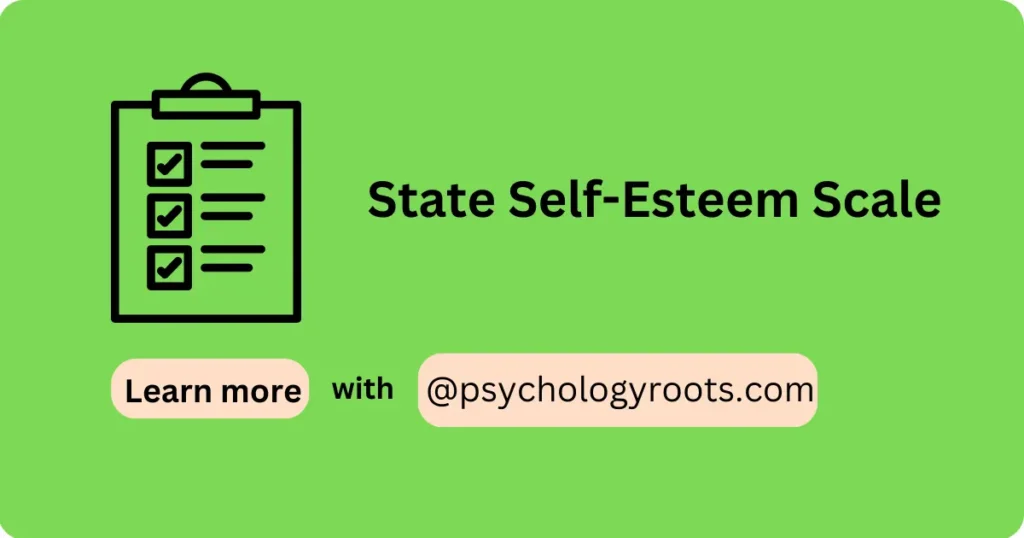Table of Contents
State Self-Esteem Scale
Here in this post, we are sharing the “State Self-Esteem Scale”. You can read psychometric and Author information. We have thousands of Scales and questionnaires in our collection (See Scales and Questionnaires). You can demand us any scale and questionnaires related to psychology through our community, and we will provide you with a short time. Keep visiting Psychology Roots.
About Scale Name
Scale Name
State Self-Esteem Scale
Author Details
Thomas F. Heatherton and Jane Polivy
Translation Availability
Not Sure

Background/Description
The State Self-Esteem Scale (SSES) is a 20-item self-report measure of state self-esteem, which is defined as a person’s momentary evaluation of their worth as a person. The scale was developed by Thomas F. Heatherton and Jane Polivy in 1991. The SSES consists of three subscales: performance, social, and appearance state self-esteem.
The SSES has been used in a variety of research studies to assess state self-esteem in different populations, including adults, adolescents, and clinical populations. The scale has good psychometric properties, including reliability and validity.
Background: The concept of state self-esteem was first introduced by Heatherton and Polivy in 1991. They argued that self-esteem is not a fixed trait, but rather a dynamic state that can fluctuate over time. They developed the SSES to measure these temporary fluctuations in self-esteem.
The SSES is based on the Janis-Field Feelings of Inadequacy Scale, which was developed in 1959. The Janis-Field scale was designed to measure overall feelings of inadequacy, while the SSES is specifically designed to measure state self-esteem.
Introduction: The SSES is a 20-item self-report scale. Respondents are asked to rate how they feel about themselves at the moment on a 5-point scale, ranging from 1 (not at all) to 5 (extremely). The scale consists of three subscales:
- Performance state self-esteem: This subscale measures how respondents feel about their abilities and accomplishments.
- Social state self-esteem: This subscale measures how respondents feel about their social relationships and interactions.
- Appearance state self-esteem: This subscale measures how respondents feel about their physical appearance.
The SSES has been shown to have good psychometric properties. The scale has high internal consistency, test-retest reliability, and convergent validity.
The SSES is a useful tool for researchers and clinicians who want to measure state self-esteem. The scale is easy to administer and score, and it has been shown to be reliable and valid.
Administration, Scoring and Interpretation
- Introduce the scale. Explain to the respondent that the SSES is a measure of how they feel about themselves at the moment. Tell them that there are no right or wrong answers, and that they should be honest in their responses.
- Read the items. Read each item aloud to the respondent. If the respondent is able to read, they can read the items themselves.
- Record the responses. As the respondent rates each item, record their response on the scoring sheet.
- Thank the respondent. Thank the respondent for their time and participation.
Reliability and Validity
The State Self-Esteem Scale (SSES) has been shown to have good psychometric properties. The scale has high internal consistency, test-retest reliability, and convergent validity.
Internal consistency refers to the degree to which the items on a scale measure the same construct. The SSES has high internal consistency, with Cronbach’s alpha coefficients ranging from 0.85 to 0.91. This means that the items on the scale are all measuring state self-esteem, and that they are not measuring other constructs, such as mood or anxiety.
Test-retest reliability refers to the degree to which the scale measures the same construct over time. The SSES has good test-retest reliability, with correlations between test and retest scores ranging from 0.70 to 0.80. This means that the scale is relatively stable over time, and that it is not simply measuring temporary fluctuations in mood or anxiety.
Convergent validity refers to the degree to which the scale correlates with other measures of the same construct. The SSES has good convergent validity, with correlations with other measures of state self-esteem ranging from 0.50 to 0.70. This means that the SSES is measuring the same construct as other measures of state self-esteem.
Available Versions
20-Items
Reference
Heatherton, T. F., & Polivy, J. (1991). Development and validation of a scale for measuring state self-esteem. Journal of Personality and Social Psychology, 60(6), 895-910. https://doi.org/10.1037/0022-3514.60.6.895
Important Link
Scale File:
Frequently Asked Questions
What is the SSES?
It is a 20-item self-report measure of state self-esteem.
Who developed the SSES?
Thomas F. Heatherton and Jane Polivy developed the SSES in 1991.
What are the subscales of the SSES?
The SSES has three subscales: performance, social, and appearance state self-esteem.
How is the SSES scored?
The SSES is scored by adding up the respondent’s scores for each item.
What are the psychometric properties of the SSES?
The SSES has high internal consistency, test-retest reliability, and convergent validity.
Disclaimer
Please note that Psychology Roots does not have the right to grant permission for the use of any psychological scales or assessments listed on its website. To use any scale or assessment, you must obtain permission directly from the author or translator of the tool. Psychology Roots provides information about various tools and their administration procedures, but it is your responsibility to obtain proper permissions before using any scale or assessment. If you need further information about an author’s contact details, please submit a query to the Psychology Roots team.
Help Us Improve This Article
Have you discovered an inaccuracy? We put out great effort to give accurate and scientifically trustworthy information to our readers. Please notify us if you discover any typographical or grammatical errors.
Make a comment. We acknowledge and appreciate your efforts.
If you have any scale or any material related to psychology kindly share it with us at psychologyroots@gmail.com. We help others on behalf of you.